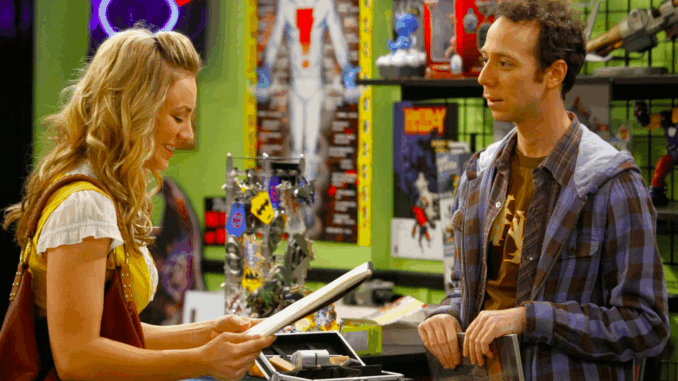
More Than Just a Backdrop
In The Big Bang Theory, the comic book store might appear at first as just another quirky location—an amusing set filled with rare collectibles, superhero debates, and awkward silences. But to the core group of characters, it was much more than that. Stuart Bloom’s modest, slightly shabby shop became a sanctuary, a social hub, and in many ways, the emotional heart of the series.
In a world where socially awkward geniuses often felt like misfits, the comic book store was the one place where they didn’t have to pretend to be anything other than themselves.
A Place of Comfort for the Brilliant but Misunderstood
Sheldon, Leonard, Raj, and Howard were all incredibly intelligent, but they also struggled with emotional intelligence and social cues. Outside the university or their apartments, they often felt alienated. The comic book store was a safe zone—a judgment-free space where their love for superheroes, collectibles, and lore could flourish without fear of ridicule.
In many ways, it reflected their inner worlds. The store wasn’t sleek or mainstream—it was cluttered, specific, and full of niche knowledge. Just like them.
Whereas bars and clubs were portrayed as intimidating or out of sync with their personalities, the comic book store was a refuge. It didn’t demand small talk or social performance. It simply allowed them to exist and connect.
Superheroes as Identity Anchors
The debates in the store were more than just fun banter—they were vehicles for self-expression. When the guys argued over who would win in a fight—Thor or Superman, Flash or Green Lantern—it wasn’t just about comics. It was a reflection of their values, their insecurities, and their aspirations.
Sheldon’s devotion to Spock and logic echoed his desire to live in a world ruled by rationality. Leonard’s attachment to Superman often hinted at his longing to be stronger and more confident than he felt. Howard, dressing as Batman or donning a belt of gadgets, masked his insecurities about being the only non-PhD in the group.
Through their heroes, they understood themselves. And in the comic book store, they were free to wear those identities proudly.
Stuart Bloom: A Comic Relief and Tragic Mirror
Stuart, the comic book store owner, is a character who oscillated between comic relief and quiet tragedy. He was an artist, a small business owner, and one of the only non-scientist regulars in the show. Despite being outside their academic world, Stuart fit in perfectly because he too was a misfit—socially awkward, unlucky in love, and often financially strained.
Yet Stuart also served as a reflection of the others: what happens when the passion for niche interests isn’t balanced by career success or self-confidence. His loneliness and self-deprecation were sometimes painful to watch, but also deeply human.
In time, though, Stuart’s role in the group solidified. He became a babysitter, a roommate, a pseudo-family member. By the end of the series, he had found love and stability, echoing the arc of many of the main characters.
Key Episodes and Moments in the Comic Book Store

The comic book store wasn’t just a location—it was central to some of the most memorable storylines:
-
Season 4, Episode 21 (“The Agreement Dissection”): Amy visits the store, creating hilarious tension as she deconstructs the boys’ obsession with superheroes. Her presence challenged their worldview in a way that was both intellectual and deeply personal.
-
Season 7, Episode 13 (“The Occupation Recalibration”): The store catches fire and is destroyed, a turning point that represents not just the loss of a location, but a challenge to their community. Its eventual reopening brought the characters—and fans—a sense of restoration.
-
Season 12, Episode 11 (“The Paintball Scattering”): Stuart takes Denise, his love interest, on a date to the store. Their chemistry showed how even the most unconventional places could be romantic, heartfelt, and meaningful.
These moments underscore how integral the comic book store was—not just as a setting, but as a stage for character growth.
The Store as a Symbol of Change and Stability
As the characters evolved—getting married, changing jobs, having children—the comic book store remained largely the same. This provided continuity, a reminder of their shared history. But even it evolved slightly, especially after Denise was introduced and Stuart became more confident.
In a show that navigated change and maturity, the comic book store stood as a symbol of where they came from. It anchored them. And when the world got too overwhelming, it was always there.
A Place for Outsiders to Belong
More broadly, the store spoke to The Big Bang Theory’s overarching theme: finding a place in the world. For fans who saw themselves in the characters—introverted, intellectual, socially anxious—the comic book store was aspirational. It showed that there is a place where you can be yourself and still belong.
It told fans, implicitly: “You are not alone. Your passions matter. And your people are out there.”
Conclusion: Not Just Panels and Pages
In the world of The Big Bang Theory, the comic book store wasn’t just shelves of Batman and X-Men. It was a canvas for friendship, self-discovery, heartbreak, and healing. It was the one public place where these unconventional heroes could be their authentic selves.
While the show gave us laughs, theories, and unforgettable one-liners, the comic book store gave the characters something just as important: a home outside of home.